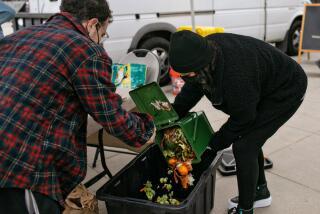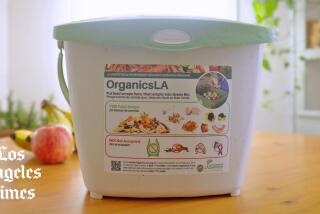Compost: A Mix of Manure, Microbes, Mail
- Share via
DALLAS — From post to compost?
Try taking some junk mail --yes, those pesky fliers, catalogs and coupons--and add some rhino manure and produce.
Environmental researchers say the combination may produce garden magic.
Dallas and Fort Worth post offices are sending junk mail to researchers, who are turning it into compost and testing it for use in gardens.
Horticulturists at the Texas A&M; Extension Service hope to have test results back in January. The program is the first of its kind.
“We started thinking about the environment,” said Cesta Ayers, manager of corporate relations for the U.S. Postal Service’s southwest area. “The idea is not to throw the . . . undeliverable bulk business mail away, but to put it back into the system.”
Post offices in June sent 150 tons of undeliverable bulk mail to Silver Creek Materials Recycling & Compost in Lake Worth, nine miles west of Fort Worth, where the papers were converted to compost.
“We take it through the machine and it goes through and rips it up and makes compost out of it--that, along with a lot of other different things that all get composted down together,” said Norene Solt, a dispatcher at Silver Creek. “They take discarded beer, wine, spirits and Coca-Cola beverages, which help decompose the compost. I think it’s the yeast in it, the microbes, that get the action going.”
A half-ton sample of the new material then went to the extension service in Stephenville, 90 miles southwest of Dallas, for testing on 300 tomato plants.
“We may not see significant results in immediate use,” horticulturist Nancy Roe said earlier this year. “The long-term potential for commercial growers to use a recycled product like this in field crops and greenhouses could be significant.”
Solt said people could use junk mail to make compost at home if they could endure the four-month hassle--and the stench.
“They have to know what to do to get a good compost going,” she said. “We put in manure--hippo and rhino manure from the zoo--and we take in produce from different grocery stores.”
Containers made of recyclable materials themselves are available at Dallas and Fort Worth post offices specifically for junk mail as an alternative to garbage cans. Each month, about 500 tons of the stuff goes undelivered.
The compost program could go nationwide, especially if it’s a moneymaker, said Mike Fanning, environmental specialist at the postal service’s Washington, D.C., headquarters. The postal service made $8 million last year through its corporate recycling program.
“The preliminary results are very gratifying. This is a really good compost and it will be an even better mulch,” Fanning said. “It’s going to depend on economic and environmental issues.”






